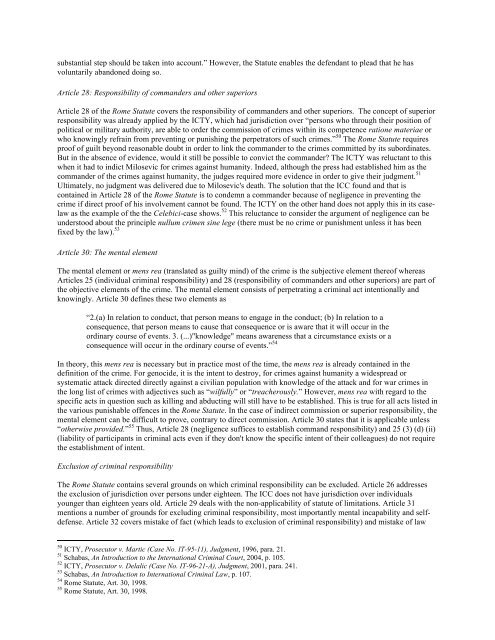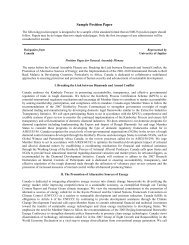International Criminal Court (ICC) - National Model United Nations
International Criminal Court (ICC) - National Model United Nations
International Criminal Court (ICC) - National Model United Nations
Create successful ePaper yourself
Turn your PDF publications into a flip-book with our unique Google optimized e-Paper software.
substantial step should be taken into account.” However, the Statute enables the defendant to plead that he has<br />
voluntarily abandoned doing so.<br />
Article 28: Responsibility of commanders and other superiors<br />
Article 28 of the Rome Statute covers the responsibility of commanders and other superiors. The concept of superior<br />
responsibility was already applied by the ICTY, which had jurisdiction over “persons who through their position of<br />
political or military authority, are able to order the commission of crimes within its competence ratione materiae or<br />
who knowingly refrain from preventing or punishing the perpetrators of such crimes.” 50 The Rome Statute requires<br />
proof of guilt beyond reasonable doubt in order to link the commander to the crimes committed by its subordinates.<br />
But in the absence of evidence, would it still be possible to convict the commander? The ICTY was reluctant to this<br />
when it had to indict Milosevic for crimes against humanity. Indeed, although the press had established him as the<br />
commander of the crimes against humanity, the judges required more evidence in order to give their judgment. 51<br />
Ultimately, no judgment was delivered due to Milosevic's death. The solution that the <strong>ICC</strong> found and that is<br />
contained in Article 28 of the Rome Statute is to condemn a commander because of negligence in preventing the<br />
crime if direct proof of his involvement cannot be found. The ICTY on the other hand does not apply this in its caselaw<br />
as the example of the the Celebici-case shows. 52 This reluctance to consider the argument of negligence can be<br />
understood about the principle nullum crimen sine lege (there must be no crime or punishment unless it has been<br />
fixed by the law). 53<br />
Article 30: The mental element<br />
The mental element or mens rea (translated as guilty mind) of the crime is the subjective element thereof whereas<br />
Articles 25 (individual criminal responsibility) and 28 (responsibility of commanders and other superiors) are part of<br />
the objective elements of the crime. The mental element consists of perpetrating a criminal act intentionally and<br />
knowingly. Article 30 defines these two elements as<br />
“2.(a) In relation to conduct, that person means to engage in the conduct; (b) In relation to a<br />
consequence, that person means to cause that consequence or is aware that it will occur in the<br />
ordinary course of events. 3. (...)"knowledge" means awareness that a circumstance exists or a<br />
consequence will occur in the ordinary course of events.” 54<br />
In theory, this mens rea is necessary but in practice most of the time, the mens rea is already contained in the<br />
definition of the crime. For genocide, it is the intent to destroy, for crimes against humanity a widespread or<br />
systematic attack directed directly against a civilian population with knowledge of the attack and for war crimes in<br />
the long list of crimes with adjectives such as “wilfully” or “treacherously.” However, mens rea with regard to the<br />
specific acts in question such as killing and abducting will still have to be established. This is true for all acts listed in<br />
the various punishable offences in the Rome Statute. In the case of indirect commission or superior responsibility, the<br />
mental element can be difficult to prove, contrary to direct commission. Article 30 states that it is applicable unless<br />
“otherwise provided.” 55 Thus, Article 28 (negligence suffices to establish command responsibility) and 25 (3) (d) (ii)<br />
(liability of participants in criminal acts even if they don't know the specific intent of their colleagues) do not require<br />
the establishment of intent.<br />
Exclusion of criminal responsibility<br />
The Rome Statute contains several grounds on which criminal responsibility can be excluded. Article 26 addresses<br />
the exclusion of jurisdiction over persons under eighteen. The <strong>ICC</strong> does not have jurisdiction over individuals<br />
younger than eighteen years old. Article 29 deals with the non-applicability of statute of limitations. Article 31<br />
mentions a number of grounds for excluding criminal responsibility, most importantly mental incapability and selfdefense.<br />
Article 32 covers mistake of fact (which leads to exclusion of criminal responsibility) and mistake of law<br />
50 ICTY, Prosecutor v. Martic (Case No. IT-95-11), Judgment, 1996, para. 21.<br />
51 Schabas, An Introduction to the <strong>International</strong> <strong>Criminal</strong> <strong>Court</strong>, 2004, p. 105.<br />
52 ICTY, Prosecutor v. Delalic (Case No. IT-96-21-A), Judgment, 2001, para. 241.<br />
53 Schabas, An Introduction to <strong>International</strong> <strong>Criminal</strong> Law, p. 107.<br />
54 Rome Statute, Art. 30, 1998.<br />
55 Rome Statute, Art. 30, 1998.









